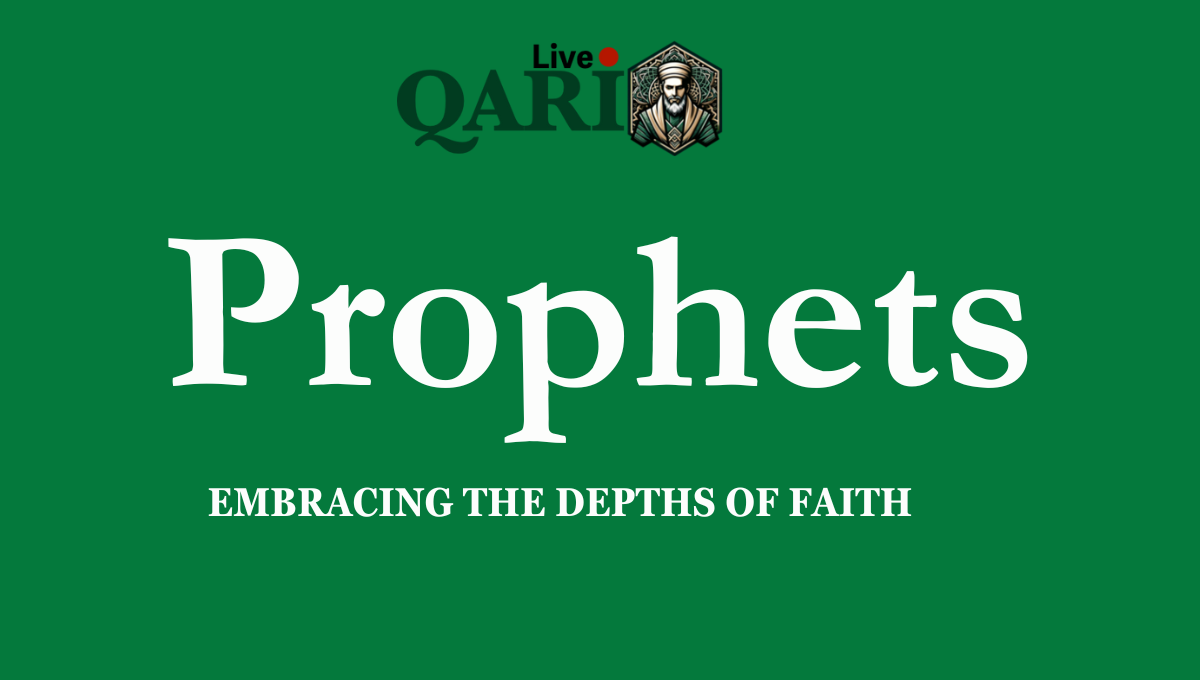
The concept of prophets in Islam is not only intriguing but profoundly influential in shaping the religious, social, and ethical landscapes. The role of prophets as divine messengers unfolds an intricate tapestry of spiritual lessons and guidance. But what exactly is a prophet in Islam? This article aims to shed light on this central question while also discussing various facets like the count of prophets and Prophets mention in Quran and their divine missions.
Role as Messengers The prophets serve as the mouthpiece of Allah, guiding individuals and sometimes whole communities toward ethical conduct and religious fulfillment.
Theological Importance The role of prophethood is so pivotal in Islamic theology that it is considered the medium through which divine wisdom is imparted to human beings, ensuring a balanced spiritual and social life.

Counting the Prophets Mention In Quran
There are traditionally believed to be 124,000 prophets in Islam, though only 25 are mentioned by name in the Quran.
Adam (آدم)
Reference Surah Al-A’raf (7:11)
Significance Recognized as the first human and prophet. His creation marks the beginning of the human race.
Idris (إدريس)
Reference Surah Maryam (19:56)
Significance He was a man of truth and patience and was raised to a high station by Allah.
Nuh (Noah | نوح):
Reference Surah Nuh (71:1)
Significance He was sent to guide a people who had deviated. He built an ark to save the believers from a great flood.
Hud (هود)
Reference Surah Al-A’raf (7:65)
Significance Sent to the people of ‘Ad, who were known for their mighty power but rejected the signs of God.
Saleh (صالح)
Reference Surah Al-A’raf (7:73)
Significance Sent to the people of Thamud who demanded a sign and were shown the miracle of the she-camel.
Lut (Lot | لوط)
Reference Surah Al-A’raf (7:80)
Significance Sent to a people who had lost their moral compass, indulging in homosexuality.
Ibrahim (Abraham | إبراهيم)
Reference Surah Al-Baqarah (2:124)
Significance Recognized for his strong faith, he rejected his people’s idolatry and was tested many times by Allah, including being commanded to sacrifice his son.
Ismail (Ishmael | إسماعيل)
Reference Surah Maryam (19:54)
Significance He was known for his patience and obedience when his father Ibrahim was commanded to sacrifice him.
Ishaq (Isaac | إسحاق)
Reference Surah Maryam (19:49)
Significance The son of Ibrahim and the father of Yaqub. He was blessed with prophethood like his forefathers.
Yaqub (Jacob | يعقوب)
Reference Surah Yusuf (12:6)
Significance He was gifted with a deep understanding, and his story is closely linked with his son, Yusuf.
Yusuf (Joseph | يوسف)
Reference Surah Yusuf (12:4)
Significance He was known for his patience and steadfastness. His life story, involving betrayal by his brothers, his time in Egypt, and his eventual reunion with his family, is detailed in Surah Yusuf.
Shu’ayb (شعيب)
Reference Surah Al-A’raf (7:85)
Significance Sent to the people of Madyan who were engaged in fraudulent business practices.
Musa (Moses | موسى)
Reference Surah Taha (20:9)
Significance Sent to Pharaoh and the Children of Israel. His life includes many notable events, such as the parting of the sea.
Harun (Aaron | هارون)
Reference Surah Taha (20:30)
Significance Brother and assistant of Musa, he played a crucial role during the exodus.
Dhul-Kifl (ذو الكفل)
Reference Surah Sad (38:48)
Significance Little is known about him, but he is believed to have been a prophet.
Dawud (David | داود)
Reference Surah Sad (38:17)
Significance A king and prophet known for his wisdom, justice, and melodious voice.
Sulayman (Solomon | سليمان)
Reference Surah Sad (38:30)
Significance Dawud’s son, known for his wisdom, was able to communicate with animals and jinn.
Ilyas (Elias | إلياس)
Reference Surah Al-Saffat (37:123)
Significance Sent to the people who worshipped the idol Baal.
Alyasa (Elisha | اليسع)
Reference Surah Sad (38:48)
Significance Successor of Ilyas and known for his miracles.
Yunus (Jonah | يونس)
Reference Surah Al-Saffat (37:139)
Significance He is known for being swallowed by a giant fish after he abandoned his people without God’s permission.
Zakariya (Zechariah | زكريا)
Reference Surah Maryam (19:2)
Significance He was blessed with a son, Yahya, in old age.
Yahya (John | يحيى)
Reference Surah Maryam (19:12)
Significance Known for his piety and chastity.
‘Isa (Jesus | عيسى)
Reference Surah Al-Imran (3:52)
Significance Born miraculously to Maryam (Mary) and known for his numerous miracles.
Uzair (Ezra | عزير)
Reference Surah At-Tawbah (9:30)
Significance He was highly respected by the Children of Israel, but some mistakenly exalted him as a son of God.
Muhammad (محمد)
Reference Surah Muhammad (47:2)
Significance The final prophet and messenger sent to humanity with the complete and final revelation, the Quran.
Nabi vs Rasul
Though often used interchangeably, “Nabi” and “Rasul” have subtle differences. A Nabi is a prophet specific to their community, while a Rasul is a messenger who brings a new set of laws or significant guidance.
The Quran is rich with references to prophets. For instance, Musa (Moses) is mentioned 136 times, which underlines his substantial role in Islamic teachings.
Selected Prophets
| Musa (Moses) | Mentioned 136 times, he is renowned for leading the Israelites out of Egypt. |
| Ibrahim (Abraham) | Found 69 times, recognized for his unwavering faith. |
| Nuh (Noah) | Cited 43 times, famous for the Ark and the great flood. |
| Lut (Lot) | Mentioned 27 times, known for his stance against societal corruption. |
| Yusof (Joseph) | Appears 27 times, celebrated for his patience and wisdom. |
| Isa (Jesus) | Mentioned 25 times, notable for his miracles and his status as the Messiah in Islamic eschatology. |
Exploring the Quran
Exploring the Quran is like going on an exciting adventure through the holy book of Islam. It’s full of stories and teachings from God, shared by important people called prophets. Some famous prophets in the Quran include Adam, the very first person and prophet; Noah, who built a big boat called the Ark; Abraham, who taught about believing in one God; Moses, who led his people out of a tough situation in Egypt; and Jesus, who is respected as a prophet in Islam.
These prophets teach us about having faith, being kind, and doing what’s right. They show us how to live the way God wants us to. So, exploring the Quran isn’t just about learning; it’s also about finding our way in life with God’s help, just like millions of people have done throughout history.
In total, 25 prophets mention in Quran, each adding a different layer to the religious tapestry. From Adam to Muhammad, these prophets represent a lineage of divine guidance. Among them, four prophets are considered Arab: Hud, Saleh, Shuaib, and Muhammad.
For more information related to Quran click here.
Quranic References
Divine Mission
The Reason for Sending Prophets
The primary reason for sending prophets in Islam is to guide humanity, deliver God’s message, and lead people toward righteous and moral paths, reminding them of their duties and responsibilities towards God and fellow beings.
The Sin Question
Though highly revered, prophets in Islam are not considered infallible. They are human and susceptible to minor errors, but they do not commit major sins.

The Final Prophet
- Muhammad is considered the final prophet, sealing the lineage and bringing the most comprehensive guidance through the Quran.
- His life and teachings offer a complete package of spiritual, ethical, and social guidelines, which is considered the ultimate roadmap for a fulfilling life.
Frequently Asked Questions(FAQS)
How many prophets were mentioned in the Quran?
There are 25 prophets mentioned in Quran.
What is the difference between a Nabi or Rasul?
A Nabi is specific to their own community, whereas a Rasul brings significant new guidance or laws.
Who are the four prophets mentioned in the Quran who were Arab?
The four Arab prophets are Hud, Saleh, Shuaib, and Muhammad.
Are prophets in Islam considered infallible?
Prophets are revered but not considered infallible; they are susceptible to minor errors but do not commit major sins.
Who is the final prophet in Islam?
Muhammad is considered the final prophet, completing the line of prophethood.
Conclusion
The prophets mention in Quran serve as more than mere historical figures; they are the epitome of moral and spiritual excellence. Through the Quran and the Hadith, their lives provide timeless lessons that continue to guide millions today.




